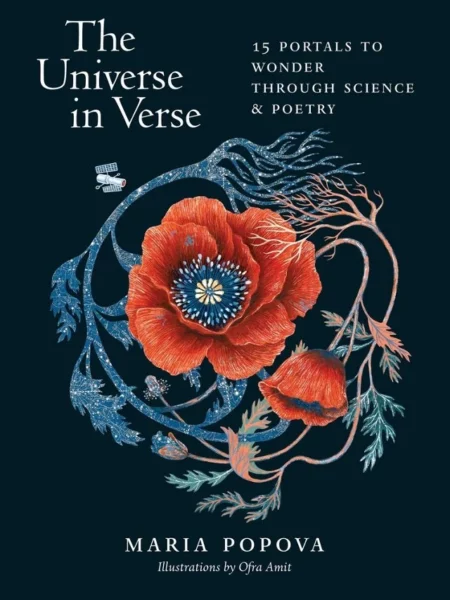The Universe in Verse: 15 Portals to Wonder Through Science and Poetry
By Maria Popova
Illustrations by Ofra Amit
Storey Publishing, 2024

If books are medicine, The Universe in Verse by Maria Popova is a cure-all. In a scant 100 pages, it demands nothing but your loving attention, and in return, it feeds your battered soul with art, ideas, and poetry. Popova elaborates: “Poetry may seem an improbable portal into the fundamental nature of reality – into dark matter and the singularity, evolution and entropy, Hubble’s law and pi – but it has a lovely way of sneaking ideas into our consciousness through the backdoor of feeling, bypassing our ordinary ways of seeing and relating to the world.” It is through this slant-wise entry into our hearts that we are able to grasp the almost unfathomable concepts of our existence. And, like any good medicine, it is a book that can simply help get us through the day.
My writing often references astrophysics, quantum mechanics, or some other dense branch of science, so when readers ask where I get my quirky information from, I direct them to Maria Popova’s blog, the Marginalian. Popova is a woman whose imagination expands beyond the ordinary walls of perception and understands that art and science are deeply entwined. As Ursula K. Le Guin states in the epigraph, “Science describes accurately from the outside, poetry describes accurately from inside. Science explicates, poetry implicates. Both celebrate what they describe.” The Universe in Verse is organized by chapters consisting of three perfect parts, beginning with a piece of art by Ofra Amit, followed by a short essay by Popova on the relationship a particular poet has with the natural world, and ending with a poem from such luminaries as Dickenson, Adrienne Rich, Plath, and Diane Ackerman. One combination, in the chapter “From Entropy and the Art of Alternative Endings,” starts with an image of two men in an embrace intertwined with plant material, followed by Popova’s essay on W.H. Auden — “he wove a science-lensed lucidity into his poetic search for truth” — in which she explores the gradual decline of all matter into disorder. “We are only alive because our sun is burning out,” she writes. “Without entropy there would be no us.” This is a useful reminder in this disordered time. The chapter ends with Auden’s poem “The More Loving One,” which has the famous lines, “If equal affection cannot be, Let the more loving one be me.”
In another chapter, “Euclid and the Dazzling Beauty of Universal Truth,” Popova writes about the history of Euclid and Euclidian geometry, which simply holds that the angles inside a triangle always add up to 180 degrees. She pairs this with “Euclid Alone Has Looked on Beauty Bare,” an early poem by Edna St. Vincent Millay. Who knew that Edna crushed so hard on Euclid? There are many such wonderful facts and ideas in this slim book. I had not even been aware of the existence of SETI, an institute dedicated to the search for extraterrestrial intelligence, before Popova brought it to my attention in a chapter called “The Search for Life.” It is paired with a poem by Diane Ackerman, who wrote scientifically accurate poems about the universe and a non-fiction book I consider a personal touchstone, A Natural History of the Senses. After reading her poem, “We Are Listening,” it should surprise no one that Carl Sagan was Ackerman’s doctoral advisor at Cornell.
There are fifteen such chapters, which Popova rightly calls portals to wonder, each one to be savored and revisited. In an era where science is under attack, her words are an existential balm. And yet, what Popova finds the most fascinating is what we don’t know and may never know: “Dark matter is 95% of the matter in the universe. Our visible life is the aberration. It represents our complete ignorance of reality.” Our complete ignorance of reality. These might be words to live by in the coming years. As misinformation merges with artificial intelligence, it may be some small comfort to reflect that we’ve always had a loose grasp on reality, and we’ve managed to survive anyway.
JoeAnn Hart writes about the pervasive and widespread effects of the climate crisis on the natural world and the human psyche. Her most recent book, Arroyo Circle, a story of reclamation in a time of loss, was released by Green Writers Press in 2024. Her other books include the prize-winning environmental and animal fiction collection Highwire Act & Other Tales of Survival, the crime memoir Stamford ’76: A True Story of Murder, Corruption, Race, and Feminism in the 1970s, as well as Float, a dark comedy about plastics in the ocean published by Ashland Creek Press, and Addled, a social satire. She is a regular reviewer of climate and animal fiction at EcoLit Books.
